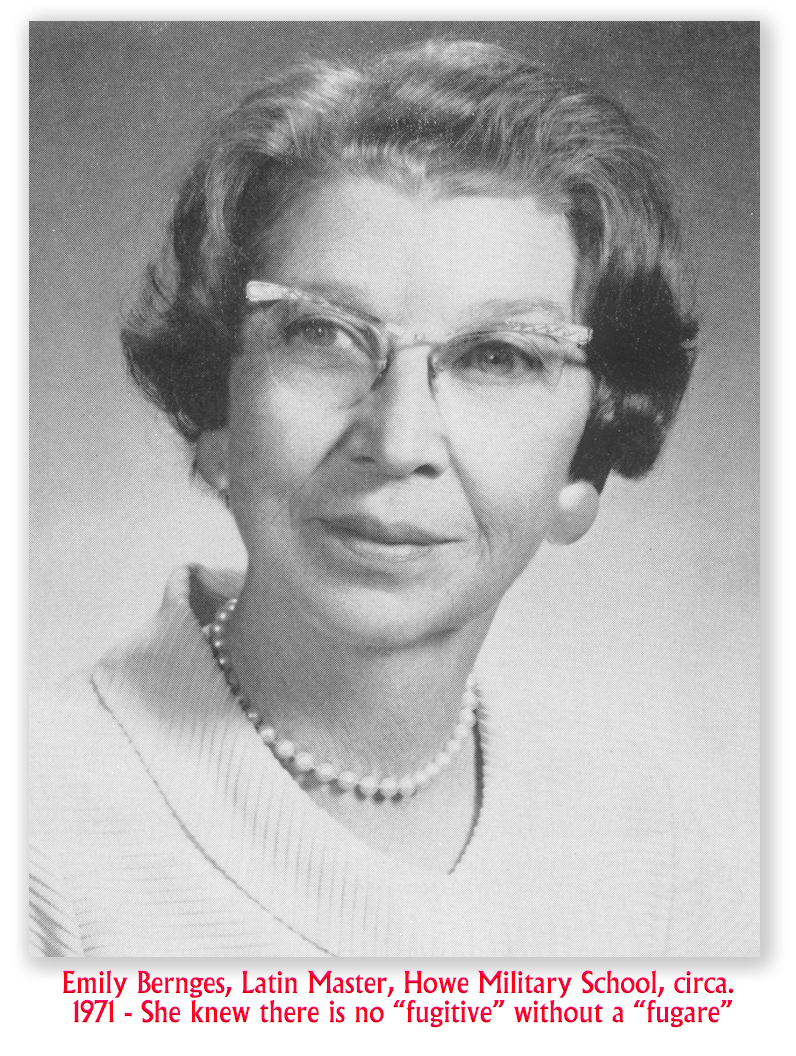We post news and comment on federal criminal justice issues, focused primarily on trial and post-conviction matters, legislative initiatives, and sentencing issues.

FLEEING IN PLACE
 Emily Bernges, my high school Latin teacher, taught us that the Latin verb “fugare” means “to flee,” and is the basis of the English word “fugitive.” Based on that, you might think that to be a fugitive, you have to take flight, or at least do something that seems like running from the law.
Emily Bernges, my high school Latin teacher, taught us that the Latin verb “fugare” means “to flee,” and is the basis of the English word “fugitive.” Based on that, you might think that to be a fugitive, you have to take flight, or at least do something that seems like running from the law.
Not necessarily, as Phillip Thompson found out. He did some federal time last decade, followed by five years of supervised release. The supervised release was not such a big deal to Phil, because he was deported to his native Jamaica as soon as he was released in 2010. Before he left for the islands, Phil was a told that one condition of his supervised release was that if he came back to the USA, he had to promptly report to his probation officer. Because returning to this country after being deported is a federal crime all by itself, you would think that the last thing Phil would want to do if he sneaked back onto the mainland was report to his PO.
You would be right. Phil returned to the USA in 2012, but got deported again about a month later, well before before his PO found out he had been back. When she did learn of it, she filed a violation petition, but Phil was already back in Jamaica and beyond the reach of the Probation Office. But Phil came back in December 2014, five months before his 5-year supervised release term expired, and this time he stayed. Having the foresight to use an alias and obtain a phony driver’s license, Phil flew under the radar for more than two years, during which time he was busily engaged in organizing large-scale marijuana importation and routing the money through bank accounts back to Jamaica (or so the authorities say).
Phil got arrested in 2017, and after his fingerprints ratted him out, his Probation Officer learned he was back. She amended the pending violation petition, and his supervised release was revoked. Phil challenged the district court’s jurisdiction to even hear his supervised release revocation, because supervised release had expired in June 2015. The district court disagreed, saying under the “fugitive tolling” doctrine, Phil was a fugitive from the time he got back to the USA until he was arrested, and his supervised release stopped running during that time.
Last week, the 4th Circuit agreed. As a general rule, the Court said, a district court’s power to revoke supervised release ends when the supervised release term expires, but the term stops running if the defendant absconds from supervised release and thus becomes a fugitive. Phil argued he was not a fugitive under the fugitive tolling doctrine, because only an active and knowing effort to evade adjudication of a supervised release violation petition is sufficient to trigger the fugitive tolling doctrine. He never knew about the July 2011 petition filed against him because he had been deported two months before.
 The 4th disagreed. The fugitive tolling doctrine provides that a supervised release term “is tolled when a defendant absconds from supervision.” That is because Congress intended defendants to serve their full supervised release term, and just as an escaped prisoner’s sentence is not credited for the time the prisoner spends out of custody, a supervised release term should not be credited for the time that a defendant, “by virtue of his own wrongful act,” spends out of supervision. Fugitive tolling, the Court said, “prevents a situation in which we reward an absconder for his misconduct, allowing a fugitive defendant to run out the clock on his release term while refusing to submit to supervision.”
The 4th disagreed. The fugitive tolling doctrine provides that a supervised release term “is tolled when a defendant absconds from supervision.” That is because Congress intended defendants to serve their full supervised release term, and just as an escaped prisoner’s sentence is not credited for the time the prisoner spends out of custody, a supervised release term should not be credited for the time that a defendant, “by virtue of his own wrongful act,” spends out of supervision. Fugitive tolling, the Court said, “prevents a situation in which we reward an absconder for his misconduct, allowing a fugitive defendant to run out the clock on his release term while refusing to submit to supervision.”
Here, Phil did not just come back to the USA and not report, but he used an alias, got phony ID, and admitted he knew he was supposed to report to the PO if he returned. That was enough to show active measures to hide, and to thus make him an absconder.
United States v. Thompson, 2019 U.S. App. LEXIS 14035 (4th Cir. May 10, 2019)
– Thomas L. Root

